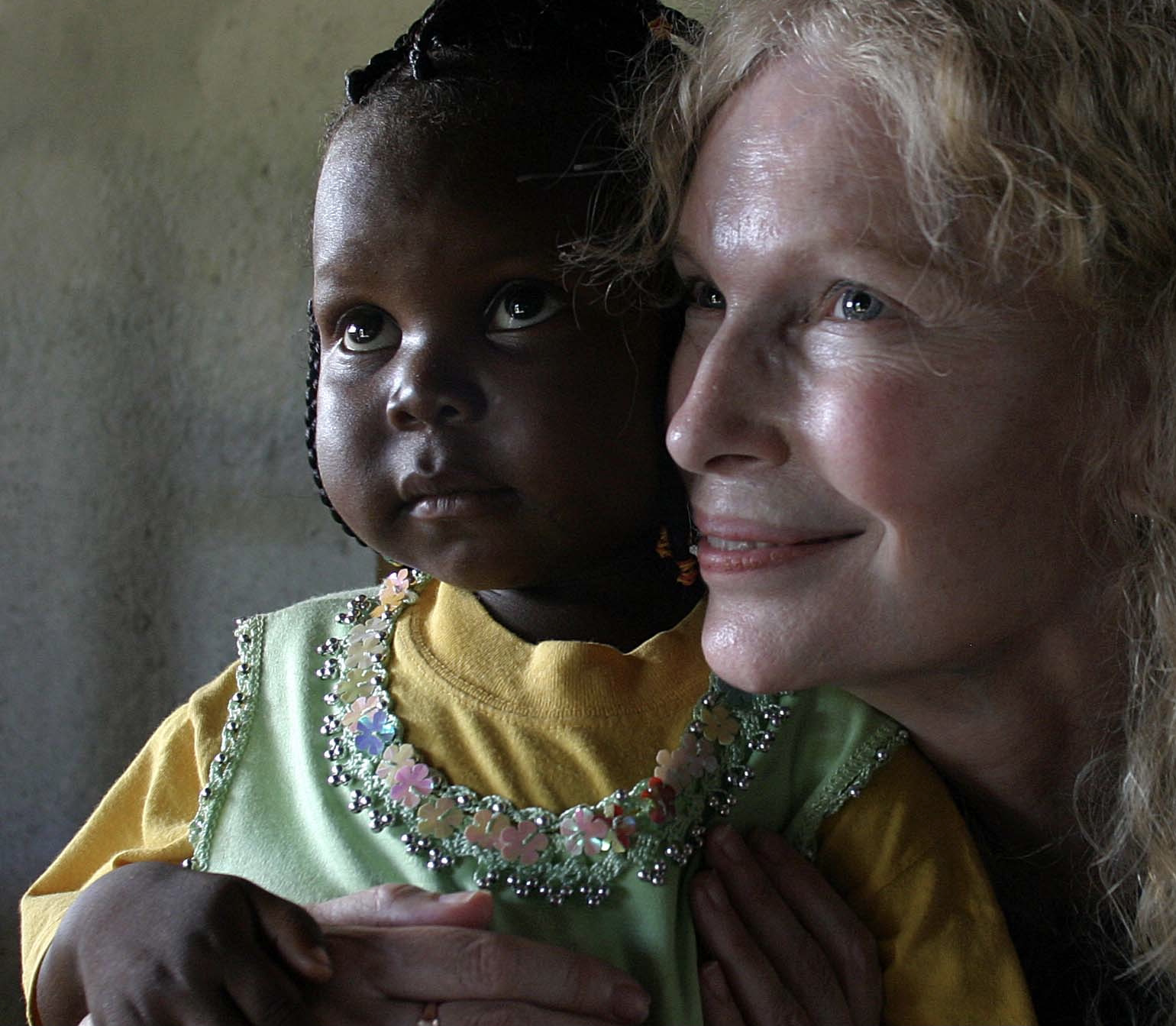The Model and The Activist
The one about the black model we all love to hate and the white activist we all just love.

Mia Farrow and a child identified as Neige in the Central African Republic in 2008 (HDPTCAR, via Flickr CC).
We’ve all heard the one about the model and the dictator. The setting is South Africa, 1997. President Nelson Mandela is hosting several prominent figures as guests in his home. Quincy Jones is there (the man gets around—literally). Supermodel—back when that meant something—Naomi Campbell is there. As is Charles Taylor, President of Liberia. (We may not all know who he is then, but we will soon find out.) At some point in the middle of the night, several men said to be representatives of Charles Taylor allegedly knock on Ms. Campbell’s door and, when she answers, offer her a diamond courtesy of Mr. Taylor, which she accepts.
Fast forward to 2010. The dictator is now on trial at The Hague for crimes against humanity and it seems the entire case hinges on whether the model—no longer “super”—can corroborate the events of that fateful night. The model thus finds herself in the hot seat. If you’d like to know how this one plays out, then I suggest waiting for the “Law and Order” episode (ripped from the headlines!).
ABC News has been selling us a Hollywood blockbuster lately, and by all appearances, we’ve bought it—hook, line and sinker. The introduction: “Allegations that fashion model Naomi Campbell was given a ‘blood diamond’ by the deposed African despot Charles Taylor have become center stage at Taylor’s trial for crimes against humanity and led to another one of Campbell’s infamous outbursts of anger.”
This post, though, isn’t about that story. It’s about the one not being told. The one about the (Black) model we all love to hate, and the (white) activist we all just … love. In this story, the central characters are Naomi Campbell and Mia Farrow.
Because, as we all know, the allegations come courtesy of Ms. Farrow, sometime actress and model (pun intended) human rights activist. You know, the Angelina Jolie (complete with gaggle of children adopted from all over the world and UN Goodwill Ambassadorship) before there was an Angelina Jolie.
Here, it’s Naomi’s word (or lack thereof) against Mia’s. This is a no-brainer.
Naomi is a model, one of the original supermodels in fact. Automatic strike. Anyone who makes more money in a day than most of us make in a year gets no sympathy. That she also gets to call Nelson Mandela a close friend seems only to add insult to injury. And to top it all off, she has anger management issues, to put it mildly. She throws things—heavy things—at the “help.” She is, in short, a petulant diva (a Black one at that, the audacity!) who doesn’t appreciate what she’s been allowed to attain. That she’s probably had to fight to attain that kind of status as a Black model in an industry that (still) doesn’t much care for them is of no consequence.
On the other hand, we have Mia, beloved actress of a bygone era in film who has recently taken up Africa’s cause. Now, the films she makes are for Darfur. She comes with a full endorsement from the United Nations, has authored numerous articles about Darfur in respected publications, and has won herself several humanitarian awards in the process. That her recommendations for solving the crisis in Sudan have included sending Blackwater operatives in to train African Union soldiers is probably chalked up to the fact that she simply cares too much. After all, when it comes to Africa, one can never care enough. And now, with the world watching, she’s just asking her “friend” (really? I’m supposed to believe that?) Naomi to care enough to do the right thing.
Of course, for celebrity activists out to save Africa, doing the right thing usually means anything but. Mia and Naomi should know, considering they’re both part of what Mother Jones recently (and brilliantly) called the celebrity recolonization of Africa.
Now, to be clear, I’m not here to defend Naomi Campbell, nor to demonize Mia Farrow. I’d just like for us not to be so quick to demonize Naomi Campbell as we give Mia Farrow a pass. Both are now at the center of a story that should, in any case, have absolutely nothing to do with them and everything to do with the man on trial for crimes against humanity and the people against whom those crimes were committed. So let’s at least consider what we’re not talking about as we’re talking about this story.



















